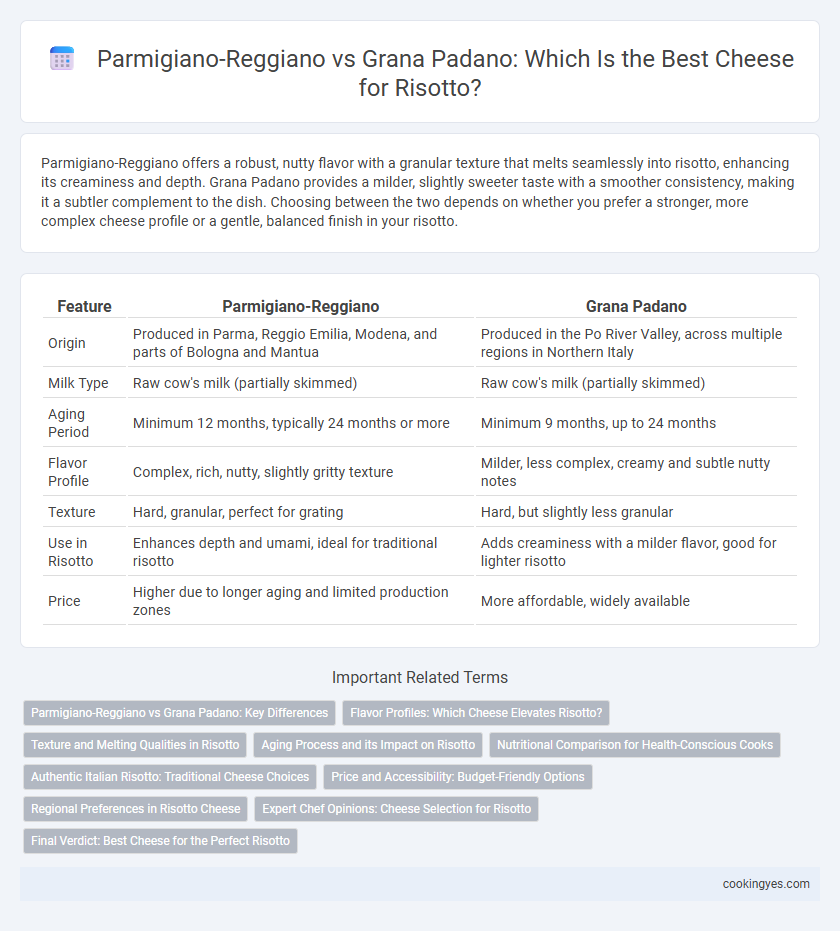Parmigiano-Reggiano offers a robust, nutty flavor with a granular texture that melts seamlessly into risotto, enhancing its creaminess and depth. Grana Padano provides a milder, slightly sweeter taste with a smoother consistency, making it a subtler complement to the dish. Choosing between the two depends on whether you prefer a stronger, more complex cheese profile or a gentle, balanced finish in your risotto.
Table of Comparison
| Feature | Parmigiano-Reggiano | Grana Padano |
|---|---|---|
| Origin | Produced in Parma, Reggio Emilia, Modena, and parts of Bologna and Mantua | Produced in the Po River Valley, across multiple regions in Northern Italy |
| Milk Type | Raw cow's milk (partially skimmed) | Raw cow's milk (partially skimmed) |
| Aging Period | Minimum 12 months, typically 24 months or more | Minimum 9 months, up to 24 months |
| Flavor Profile | Complex, rich, nutty, slightly gritty texture | Milder, less complex, creamy and subtle nutty notes |
| Texture | Hard, granular, perfect for grating | Hard, but slightly less granular |
| Use in Risotto | Enhances depth and umami, ideal for traditional risotto | Adds creaminess with a milder flavor, good for lighter risotto |
| Price | Higher due to longer aging and limited production zones | More affordable, widely available |
Parmigiano-Reggiano vs Grana Padano: Key Differences
Parmigiano-Reggiano and Grana Padano differ significantly in aging, flavor, and production area, impacting risotto preparation. Parmigiano-Reggiano, aged 12 to 36 months, offers a richer, nuttier flavor with granular texture, while Grana Padano, aged 9 to 24 months, provides a milder, creamier taste. Using Parmigiano-Reggiano in risotto enhances depth and umami, whereas Grana Padano yields a smoother, less intense cheese profile.
Flavor Profiles: Which Cheese Elevates Risotto?
Parmigiano-Reggiano offers a complex, nutty, and sharp flavor with rich umami notes that intensify the creaminess of risotto, making each bite more savory and aromatic. Grana Padano provides a milder, slightly sweeter taste with less granular texture, which blends smoothly without overpowering the delicate balance of ingredients in risotto. For a risotto that demands depth and robust flavor, Parmigiano-Reggiano elevates the dish, while Grana Padano is ideal for a subtler, more harmonious finish.
Texture and Melting Qualities in Risotto
Parmigiano-Reggiano offers a granular texture and a complex, nutty flavor that melts smoothly into risotto, creating a creamy consistency without overpowering the dish. Grana Padano provides a slightly creamier texture with a milder taste, melting evenly to enhance the risotto's silkiness but with less pronounced sharpness compared to Parmigiano-Reggiano. Choosing Parmigiano-Reggiano results in a more textured, flavorful risotto, while Grana Padano ensures a consistently smooth and mild finish.
Aging Process and its Impact on Risotto
Parmigiano-Reggiano typically ages between 12 to 36 months, resulting in a complex, granular texture and robust umami flavor that enhances risotto's creaminess and depth. Grana Padano ages for a shorter period, usually 9 to 24 months, producing a milder, less crumbly cheese that imparts a subtle sweetness and smooth melt. The longer aging of Parmigiano-Reggiano intensifies savory notes and adds a distinct nutty character, making it preferred for risotto recipes requiring a pronounced cheese presence.
Nutritional Comparison for Health-Conscious Cooks
Parmigiano-Reggiano contains slightly higher protein and calcium levels compared to Grana Padano, making it a nutrient-dense choice for risotto. Grana Padano typically has a lower fat content and fewer calories, appealing to calorie-conscious cooks seeking a lighter option without sacrificing flavor. Both cheeses provide essential vitamins such as B12 and phosphorus, supporting bone health and energy metabolism in a balanced risotto dish.
Authentic Italian Risotto: Traditional Cheese Choices
Parmigiano-Reggiano and Grana Padano are classic cheeses that enhance the flavor and creaminess of authentic Italian risotto. Parmigiano-Reggiano, known for its rich, complex flavor and granular texture, is traditionally favored in Lombardy and Emilia-Romagna regions. Grana Padano offers a milder, slightly sweeter taste, making it a versatile alternative that still preserves the Italian culinary authenticity of risotto.
Price and Accessibility: Budget-Friendly Options
Parmigiano-Reggiano, known for its intense flavor and aged complexity, tends to be priced higher due to its strict production regulations and long aging process. Grana Padano offers a more affordable alternative with a milder taste, making it a budget-friendly option for risotto without sacrificing essential cheesy richness. Both cheeses are widely accessible in most supermarkets, but Grana Padano often provides better value for those seeking quality cheese within a limited budget.
Regional Preferences in Risotto Cheese
Parmigiano-Reggiano dominates risotto recipes in Emilia-Romagna, prized for its sharp, nutty flavor that complements the creamy texture. In Lombardy, Grana Padano is favored, offering a milder, slightly sweet taste that balances delicate risottos. Regional culinary traditions influence cheese selection, making Parmigiano-Reggiano and Grana Padano essential but distinct staples in northern Italian risotto dishes.
Expert Chef Opinions: Cheese Selection for Risotto
Expert chefs emphasize Parmigiano-Reggiano for its complex umami depth and granular texture that perfectly melts into risotto, enhancing both flavor and creaminess. Grana Padano is appreciated for its milder, slightly sweeter taste and a less crumbly texture, making it a suitable alternative for those preferring a subtler cheese profile. Culinary professionals recommend Parmigiano-Reggiano for traditional risotto recipes requiring a robust flavor, while Grana Padano serves well in lighter, vegetable-based risottos to complement without overpowering.
Final Verdict: Best Cheese for the Perfect Risotto
Parmigiano-Reggiano offers a more complex, nutty flavor and granular texture that enhances the creamy consistency of risotto, making it the preferred choice for chefs aiming for authenticity and depth. Grana Padano, while milder and slightly less aged, provides a smooth, buttery profile that suits risottos requiring a subtler cheese influence without overpowering other ingredients. For the perfect risotto, Parmigiano-Reggiano is generally considered superior due to its robust taste and ability to meld seamlessly with the dish's creamy rice base.
Parmigiano-Reggiano vs Grana Padano for risotto cheese Infographic

 cookingyes.com
cookingyes.com